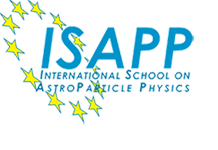Presentation
The techniques and methods developed originally in particle physics are finding their applications in a wide variety of fields. Also in geosciences, a new era in the study of the Earth interior came with a possibility to detect geoneutrinos, messengers from the radioactive decays inside the Earth, and to use cosmic ray products for a sort of radiography of the volcanic edifices, and, in perspective, of the Earth itself. The study of cosmogenic nuclides, which can give information about several aspects of the Earth’s life and history, is another example of the interconnection between particles, nuclear physics and geosciences.
Such researches need interdisciplinary skills: particle detection (geo-neutrinos, e.g. electron antineutrinos from the Earth interior, muons from cosmic rays etc.), knowledge of physics, and in particular of particle physics, and a background in geophysics, geochemistry and geology. The interpretation of the results, or even the understanding of what can be measured, requires familiarity with the Earth, its structure and composition, and the nature of volcanic systems.
This interdisciplinary skill set (i.e. nuclear/particle physics and geology) is not very common neither among physicists nor geologists, except for rare exceptions. A new community has to be built and has to acquire the knowledge and know-how. Obtaining this skill is a must, if this rich field of research should bring results, may be unexpected ones, to its fully potential.
The primary purpose of this "Summer Institute" is to bring together young physicists, geophysicists, and geologists, who, in ten days, can together acquire a working set of basic knowledge that will help them to start-up and face these inter-disciplinary studies. As a minimum of common background is mandatory, the school will start with a two-day full immersion in particle and nuclear physics for geologists and in geosciences for physicists. The school will then continue with morning classes on physics, geology, and geoscience by elementary particles. In the afternoon, one to two hours will be devoted to discussions with the teachers about the morning classes. Finally, groups of five students with a tutor will proceed to practical calculations, exercises and measurements from both fields.
This is the first school that brings together nuclear/particle physicists and geologists. It aims is to contribute to build up a new geoscience community, able to make progress in this new field opened by the union between particle physics and geology. This is just the beginning. We hope that other efforts will follow.
Scientific committee
Gianpaolo Bellini (Milan Univ. and INFN - co-chairman)
Mark Chen (Queen Univ.)
Eugenio Coccia (GSSI and Roma 2 Univ.)
Steven Dye (Hawaii Pacific University)
Gianni Fiorentini (Ferrara Univ. and INFN)
Antoine Koucher (APC- Univ. Paris VII)
Aldo Ianni (Canfranc laboratory and LNGS)
Kunio Inoue (Tohoku University)
Vedran Lekic (Maryland Univ.)
Livia Ludhova (RWTH Aachen Univ. and FZ Julich IKP-2)
Fabio Mantovani (Ferrara Univ. and INFN)
Frank Marzano (Rome "La Sapienza" Univ.)
William McDonough (Maryland Univ. - co-chairman)
Gioacchino Ranucci (Milano INFN)
Paolo Strolin (Napoli Univ. and INFN)
Hiroyuki Tanaka (University of Tokio)
Taku Tsuchiya (Ehime Univ.)
Francesco Vissani (GSSI and LNGS)
Hiroko Watanabe (Tohoku Univ.)
Sandra Zavatarelli (Genova Univ.)
and
the ISAPP Scientific Committee
Organizing Committee
Matteo Agostini (GSSI)
Gianpaolo Bellini (Milan Univ. and INFN)
Stefano Davini (GSSI)
Livia Ludhova (RWTH Aachen Univ. and FZ Julich IKP-2)
Fabio Mantovani (Ferrara Univ. and INFN)
Simone Marcocci (GSSI)
Nicola Rossi (LNGS)
Francesco Vissani (GSSI and LNGS)
Secretariat responsible
Irene Sartini (GSSI)
Webmaster
Valerio Congeduti (GSSI)

